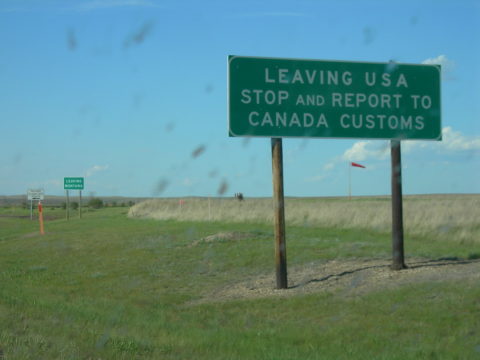In The Line, Paula Simons has a concern that I think is quite reasonable:

“Canadian Border Sign” by jimmywayne is licensed under CC BY-NC-ND 2.0
What is a reasonable general concern?
That’s not a rhetorical question. I really don’t know the answer. I’m not sure anyone else does, either.
And that’s exactly the problem with Bill S-7, a new piece of government legislation, which amends both the Customs Act and the Preclearance Act.
Bill S-7 set a new standard to allow border services officers to search through our cellphones, laptops, tablets, Apple Watches and other personal computers. If the bill passes, it will allow officers who feel a “reasonable general concern” to search through the emails, documents, texts, instant messages, photos or videos stored on our digital devices, to look for evidence that we may have violated customs regulations.
Reasonable general concern. Or, as it says in the French-language draft of the bill, “des préoccupations générales raisonnables“.
It’s an absolutely novel legal threshold. That phrase, be it in English or French, doesn’t appear anywhere else in Canadian criminal or civil law. It’s not a standard borrowed from any other country. It’s a brand new legal test to authorize an invasive search of your most private personal records and correspondence.
A reasonable concern, one might intuit, is a lower standard than a reasonable suspicion, because a concern is less grave, less specific, than a suspicion.
But a general concern? A general preoccupation?
That sounds even more vague, more subjective, than a good old-fashioned hunch or inkling.
It seems counter-intuitive, to put it mildly, to create a lower, broader standard to search our private data on our private devices than to search our conventional mail, or our suitcases, or our car trunks. Yet that is exactly what Bill S-7 does.
How did we get here? The answer is an ironic one.
Back in 2020, the Alberta Court of Appeal ruled unanimously that portions of the Customs Act were unconstitutional.
The court found the act violated the protection against unreasonable search and seizure, because it allowed for what the court called “suspicion-less and unlimited” searches of our personal digital devices.
That violation, held the court, could not be saved by section 1 of the Charter, because it allowed unfettered and unrestricted access to people’s most personal and intimate information, and because it allowed the state almost unlimited latitude to dig around in the what the court called our “biographical core of identity”.






